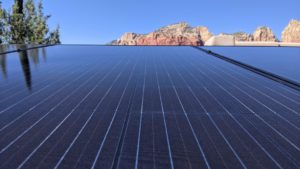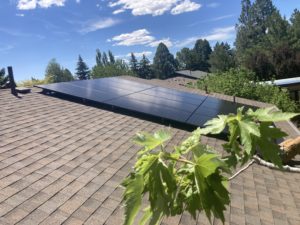Snow can be a major consideration for many solar customers in colder climates, both for homeowners looking into solar and for current customers. The good news is the snow has a minimal effect on the production of the system and is fully accounted for in the design phase. In fact, snow can be good for the system. Read on to find out how solar panels are minimally affected by the snow, how the system is designed for this, and how it can actually be helpful!
A Minimal Effect
Generally, the snow on your solar roof will be gone faster than the snow on the ground for a couple of reasons. The first reason is in the physical properties of the system: the slick glass surface of the glass creates a sliding effect, causing the snow to fall. Additionally, the pitch of the system itself will result in more snow sliding off the roof. The second reason for fast melting is that the panels will conduct more heat than most surfaces. This will result in quicker melting.
For these reasons, we don’t suggest clearing the panels yourself, although this is certainly an option. Specialized tools are made for this and great care must be taken not to damage modules. These factors minimize the effect on the productivity of the system, but the effect is minimal in the first place in regard to the year-round plan for your production and energy offset.
The storms themselves tend to not cause a problem for the system either. Manufacturers of panels must be approved by advisory bodies that require panels to withstand winds of up to 140 miles per hour and hail at up to 50 miles per hour.
A Part of the Plan
Wherever you live, your Rooftop Solar expert will use historical weather data to predict things like snowfall and adjust the size of the system accordingly. Snowy winter days usually come with the least sunshine anyway, and these days will be accounted for in your summer overproduction. When you really need the credits to run your heater in the winter, you have them saved up. Your Rooftop Solar expert can explain this more, and you can click here to read more about how you use the sunny part of the year to make up for the snowy part.
Rooftop Solar also installs our systems with a 100% warranty for parts and labor for 30 years. This is because of the level of confidence in not only our work but in the ability of the equipment to withstand the elements. Solar is a low-maintenance energy source, and all monitoring of system production is made simple and easy through the internet and an app.
Snow as a Positive
There are also a couple of positives to going solar this time of year. Snow can even serve as a free cleaning service for the panels, which can increase your productivity going forward. Additionally, colder temperatures are generally better than hot for the efficiency of the system like most electronics. This, of course, doesn’t mean your panels will produce more in the winter because the days are shorter, but it evens the curve. Furthermore, the reflective surface of the snow can actually increase production. This is because some of the sun’s light can be reflected off of the bright white surface back toward the system.
Overall, there is a minimal effect from the snow on the output of the panels, and you will even see some advantages to your production from the snow. Any time of year, there are always advantages to looking into solar, as those electric bills keep adding up all year long. Whether you live in the heat or the cold, solar is a great option, and a Rooftop Solar specialist can help show you how today!
—
news.energysage.com/solar-panels-in-winter-weather-snow-affect-power-production



